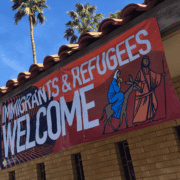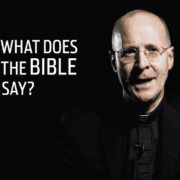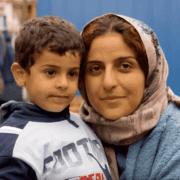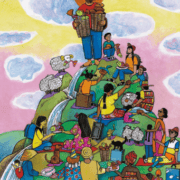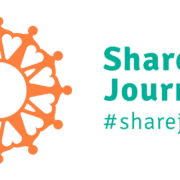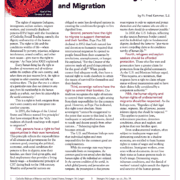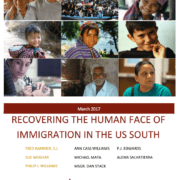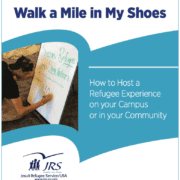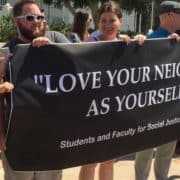The Interfaith Sanctuary Toolkit was originally created by congregations and coalitions that make up the Sanctuary Movement and was revised and updated by the Unitarian Universalist College of Social Justice (UUCSJ), Unitarian Universalist Refugee and Immigrant Services and Education (UURISE), and Church World Service (CWS) for use by all faith communities.
What does the Bible say about helping refugees, migrants and foreigners? Fr. James Martin, S.J., explains that it’s pretty clear.
Catholic leaders, including Cardinal Peter Turkson and Archbishop José Gomez, reflect on Church teaching related to welcoming refugees.
A collection of prayers related to migration assembled by the United States Conference of Catholic Bishops.
A toolkit with sample prayers, general intercessions, homily helps, bulletin insert, pulpit announcement and ideas parish leaders can help launch the “Share the Journey” global migration campaign, at Masses Oct 7-8 and participate in the week of prayer and action, Oct 7-13. Resources included in this packet are available in English and Spanish.
The rights of migrants (refugees, immigrants, asylum seekers, migrant workers, and internally displaced persons-IDPs) begin with the foundation of Catholic Social Teaching.
Migration is a complex issue that is reshaping the cultural, economic and political landscape of the planet. JustFaith Ministries is releasing a new program that offers the opportunity for small groups to engage in prayer, reading and reflection as well as discussion and discovery related to this critical and controversial issue of our day.
“Recovering the Human Face of Immigration in the U.S. South” is a joint collaboration between the Program for Immigration, Religion, and Social Change (PlRSC) at the University of Florida’s Center for Latin American Studies and the Jesuit Social Research Institute (JSRI) at Loyola University New Orleans.
While it is impossible to fully comprehend what it is like to be forced from your home and live as a refugee, Jesuit Refugee Service/USA invites you to host a Walk a Mile in My Shoes simulation, which provides individuals and communities with an opportunity to pause and experience, if only vicariously and for a few moments, the frustrations, disappointments and hopes that refugees around the world face.
BY SUSAN HAARMAN | September 11, 2017
Readings
Since the news came out about President Trump’s actions on DACA less than a week ago, my heart has been reeling from witnessing human dignity and rights of individuals so easily dismissed. I wanted to shout the line from yesterday’s second reading from Romans: “…and whatever other commandment there may be, are summed up in this saying, namely, ‘You shall love your neighbor as yourself,’ to anyone who would listen.” (Romans 13: 9) How can we not see DACA recipients who have been living, learning, and working alongside us their entire adult lives as our neighbors?
But many of us may have friends or family for whom the idea of seeing a DACA recipient as their neighbor in the way that Christ calls would be challenging. These might be the same family members we tense up around at holidays or friends with whom we change the subject when topics turn to politics, race, or other social justice issues. We might find ourselves assuming that they are beyond persuading—that it’s not worth the emotional time and effort.

[DACA rally at Loyola Marymount University, 9/2017]
Ezekiel lets us know that we are responsible for the care of each other’s souls. When the people we care about are espousing opinions or ideas drenched in hate or rooted in the sin of racism, we are called to love and care enough about them as people to dialogue directly with them. In the Gospel of Matthew, Jesus tells us to go directly to the people we may be in conflict with, be honest about what we think and feel, and see if it changes their hearts. We root our call to justice in our own relationships.
But also, perhaps more importantly, we have these conversations so our brothers and sisters on the margins don’t have to. We can shoulder some of the emotional burden that people of color, DACA recipients, and other oppressed folks experience every day. We can have conversations with family, friends, and community members that might be challenging and difficult and potentially be less at risk for being further labeled in ways our marginalized brothers and sisters wouldn’t. If you’re like me, every day you benefit from white supremacy even though you never asked to and it’s the antithesis of everything you believe in.
So every day, challenge yourself to reach out to those in your life whose actions and words don’t reflect that Kingdom Christ sought to create. Choose to have the hard conversations, to stay in relationships with those people, and hope to help them see that we are all neighbors.
Editor’s Note: This piece was originally published as part of the Ignatian Solidarity Network Rise Up: A Weekly Call to Solidarity series.
Susan Haarman is the Associate Director for Service Learning at Loyola University Chicago’s Center for Experiential Learning. She has degrees from Marquette University and the Jesuit School of Theology at Berkeley, and previously served as the Faith and Justice Campus Minister, also at Loyola University Chicago.
Interesting links
Here are some interesting links for you! Enjoy your stay :)Pages
- About
- Campaña por la Hospitalidad — Español
- Come to the Table Potlucks
- Events
- Feast of Our Lady of Guadalupe
- Français – Campagne pour l’hospitalité
- Hacer el compromiso: Quédate con los que buscan asilo
- Homepage
- Immigration Detention Center Pilgrimages
- Join The Campaign
- Light in the Darkness: Uniting in Prayer for Immigrant Families
- Light in the Darkness: Vigil for Immigrant Families
- Love Your Neighbor
- News
- Resources
- Send a Love Your Neighbor Note
- Share the love – Spread the word!
- Stories
- Take Action
- Take the Pledge: Stand With Those Seeking Asylum
- Thank you for taking the pledge

